A knowledge base is a core part of any business’s website. The best knowledge base software or knowledge base platform will allow you to create an online library that allows users to search through articles, videos, images, and other content. It should also provide tools to manage user permissions, track usage statistics, and generate reports.
In today’s world, knowledge management has become an essential component of business success. It helps companies stay ahead of their competitors by providing them with access to the information they need to succeed.
Knowledge bases are one of the most important tools for businesses today. They allow you to store information about products, processes, policies, procedures, etc., and make it accessible to employees and customers.
In addition, they help you manage customer support requests, resolve issues faster, and improve employee productivity. Over the next few years, self-service will become even more popular, especially among small businesses.
This article highlights some of the best software platforms for developing a knowledge base.
What is the best Knowledge base software for customer support?
Here is the best knowledge base software for customer support.
Help scout
Freshdesk
KnowledgeOwl
HelpJuice
HubSpot Service Hub
Zoho Desk
ZenDesk
Choosing the right knowledge base software is crucial for meeting your business’s specific needs and enhancing your knowledge management capabilities.
1. Helpscout
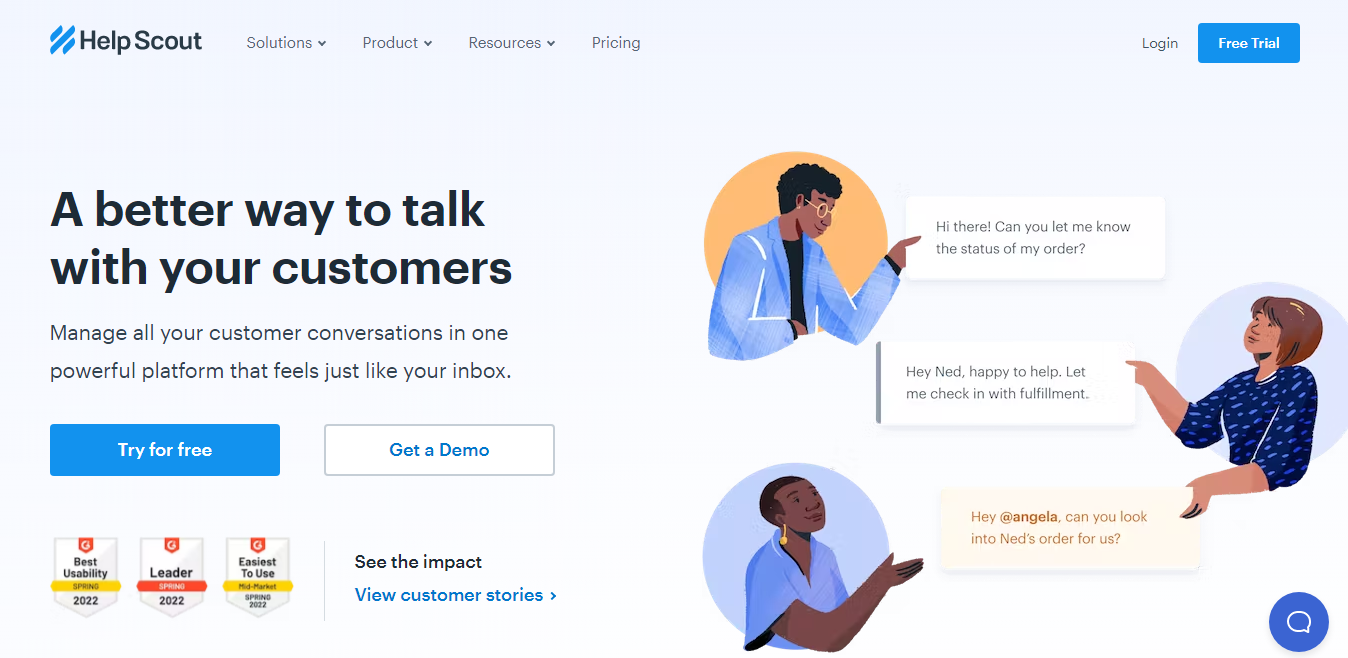
Helpscout is an easy way to create a knowledge base inside your app. You can build a knowledge base for helping your customers find answers to common questions about your product or service.
Help Scout is a knowledge base tool that helps you create a knowledge base quickly and easily. You don’t need to worry about building a database or writing complex queries. Just pick what topics you want to cover, write up some content, and start answering questions.
Then, let your customers know where to go for answers. Add a simple, responsive chat widget to your app, and your customers will never have to leave your app again.
Help Scout Key Features
Collaborate with ease using the shared inbox to offer timely email support, automate workflows, organize your inbox and personalize your support responses.
Offer customer support in real-time through live chat and collect information about your visit so you know exactly who you are talking to and improve your customer service. You can also decide when your team is available to support customers on live chat.
Use in-app messaging to engage with your customers using targeted messages, track views, track performance, and usage reports on the Messages Dashboard.
Build a self-service knowledge hub easily using an answer-based approach to address common questions your customers have.
Customize your knowledge base with your brand colors, logo, and another company branding.
Create categories to ensure easy search and find for your audience, also use reports to identify what your customers are frequently searching for so you can improve your answers and your knowledge content structure.
Detailed reporting to see how your customers are interacting with your knowledge base content. You can export your reports to excel and CSV for analysis.
Includes 90+ integrations available on the Helpscout app store.
Help Scout Pricing
You can save up to 20% when you opt for an annual plan, otherwise, prices start from $25/user/month for the standard plan, $50/use/month for the Plus plan, and pro is only available on annual plans for $65/user/month.

All plans offer a different number of mailboxes, docs sites, live chat, automated workflows, and customer properties. You get more advanced features as you go for higher-tier plans.

A user-friendly knowledge base solution with a focus on customer support.
2. Freshdesk
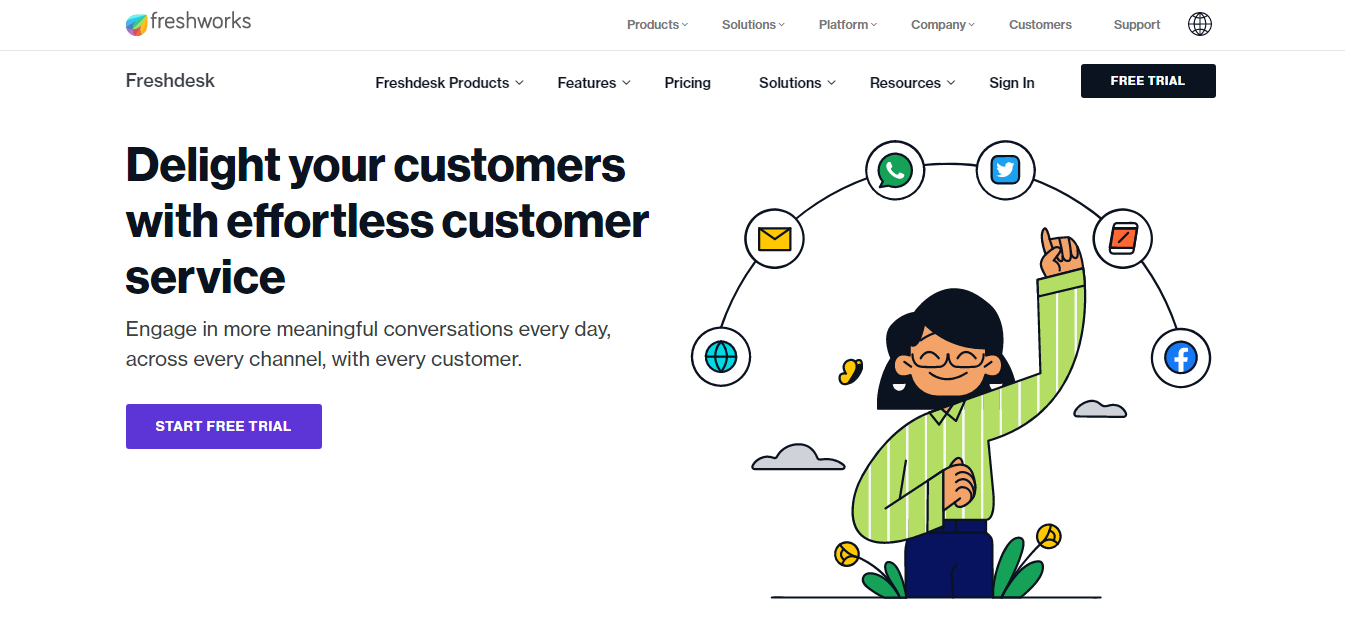
Freshdesk is a cloud-based knowledge base and helpdesk software that helps businesses offer effortless customer experiences. Knowledge base software helps organizations create a centralized hub for storing and organizing information, making it easily accessible to customers.
With Freshdesk, you can create a comprehensive knowledge base with easy-to-navigate search functionality, so you can find answers to your customer’s questions quickly and efficiently.
You can also use our Help Desk to provide support and assistance to your customers directly from the dashboard, which is completely customizable to meet your needs.
The platform comes with its own set of integrations so you can connect with other systems like Salesforce or Zendesk directly from within Freshdesk itself.
Content management features allow you to create content, categorize articles, and manage with ease.
Customizations for branding using HTL and CSS to create a personalized look and feel for your self-service portal.
Multiple self-service options Enable customers to find answers using options such as a help widget and community forum.
Multilingual capabilities: Offer a self-service portal in multiple languages to cater to a global customer base.
Search engine optimization (SEO): Empowers customers to discover answers right on a search engine.
Get feedback to find what’s working for your knowledge base through reporting, and analytics and update knowledge base articles accordingly.
Freshdesk Key Features
Freshdesk is a popular help desk software that offers a range of features to support customer service and knowledge management. Some of the key features of Freshdesk include:
Multichannel Support: Freshdesk allows you to manage customer support across multiple channels, including email, phone, chat, and social media. This ensures that your support team can handle inquiries from various platforms efficiently.
Ticketing System: Freshdesk’s robust ticketing system helps you organize and prioritize customer support requests. You can assign tickets to the right support agents, ensuring timely and effective resolution of issues.
Knowledge Base: Freshdesk’s knowledge base feature enables you to create and manage a self-service knowledge base. This allows customers to find answers to common questions on their own, reducing the load on your support agents.
Reporting and Analytics: Freshdesk provides detailed reporting and analytics to help you measure customer satisfaction, support agent performance, and other key metrics. This data-driven approach helps in continuously improving your customer support processes.
Integration with Other Tools: Freshdesk integrates seamlessly with a range of other tools and platforms, including CRM software, project management tools, and customer feedback software. This integration enhances the overall efficiency of your knowledge management process.
Freshdesk Pricing
Freshdesk offers a range of pricing plans to suit different business needs and budgets. The pricing plans include:
Sprout: This is Freshdesk’s free plan, which includes basic features such as email support, ticketing, and a knowledge base. It’s ideal for small businesses or startups looking to get started with customer support.
Blossom: Priced at $15 per agent per month, this plan includes additional features such as multichannel support, reporting, and analytics. It’s suitable for growing businesses that need more advanced support capabilities.
Garden: At $29 per agent per month, this plan offers advanced features such as automation, customization, and integration with other tools. It’s perfect for businesses looking to streamline their support processes.
Estate: This plan costs $49 per agent per month and includes enterprise-level features such as advanced reporting, customization, and integration with other tools. It’s designed for larger organizations with complex support needs.
Forest: Freshdesk’s enterprise plan includes all the features of the Estate plan, plus additional features such as dedicated support, customization, and integration with other tools. Pricing for this plan is available upon request.
3. KnowledgeOwl

When it comes to building a robust knowledge base that consolidates information and makes it easily accessible, KnowledgeOwl is the go-to solution.
With a wide range of powerful features designed to enhance knowledge management and streamline information retrieval, KnowledgeOwl stands out as an excellent choice for organizations of all sizes.
KnowledgeOwl is a feature-rich knowledge base software that empowers you to create, manage, and deliver information efficiently.
Whether you’re aiming to enhance customer support, provide self-service resources, or centralize internal knowledge, KnowledgeOwl offers the tools you need to succeed.
Make your knowledge accessible and user-friendly with KnowledgeOwl, and watch your organization thrive.
Below, we explore some of the key features that make KnowledgeOwl a top-notch knowledge base software:
KnowledgeOwl Key Features
Articles and Article Management: KnowledgeOwl provides a user-friendly platform for creating and organizing articles. You can effortlessly craft and format articles, categorize them into topics, and manage them efficiently. This ensures that your knowledge base remains organized and up-to-date.
Contextual Help Widget: Enhance user experience with KnowledgeOwl’s contextual help widget. It allows you to embed a smart, context-aware widget on your website or application, offering users instant access to relevant knowledge articles right when they need assistance.
Custom Domains: KnowledgeOwl allows you to host your knowledge base on a custom domain, giving it a professional and branded look. This feature helps in maintaining consistency across your online presence and reinforces your brand identity.
User Feedback: Stay in tune with your audience by gathering valuable feedback through KnowledgeOwl. You can enable comments and ratings on articles, providing an avenue for users to express their opinions and helping you identify areas that need improvement.
Glossary: Create a comprehensive glossary within your knowledge base to define and explain key terms, acronyms, or industry-specific jargon. This feature ensures that your audience has a clear understanding of your content.
PDF Support: KnowledgeOwl allows you to upload and include PDF documents in your knowledge base. This is especially useful when offering downloadable resources or manuals alongside your articles.
Easy Navigation: KnowledgeOwl prioritizes user-friendly navigation, making it simple for your audience to find the information they need. Users can quickly locate relevant articles with intuitive search functionality and a well-structured layout.
Analytics and Insights: Gain valuable insights into your knowledge base’s performance through KnowledgeOwl’s analytics. Track user engagement, popular articles, and search trends to continually refine your content and improve the user experience.
Responsive Design: KnowledgeOwl is designed to be responsive, ensuring that your knowledge base looks and functions seamlessly on various devices, including desktops, tablets, and smartphones.
Integration Capabilities: Integrate KnowledgeOwl with other tools and platforms you use , such as customer support software, CRM systems, or chatbots, using Zapier to provide a unified knowledge experience for your users.
KnowledgeOwl Pricing

We trust KnowledgeOwl to help us build and maintain the best knowledge base. Check it out for a free 30-day trial.
Should you choose to trust the platform you can start with the flex plan from $79/month. You can add additional Knowledgebases if you choose for $40 per month and an additional author for $20 per month.
KnowledgeOwl excels in consolidating information and making it easy to find.
4. HelpJuice
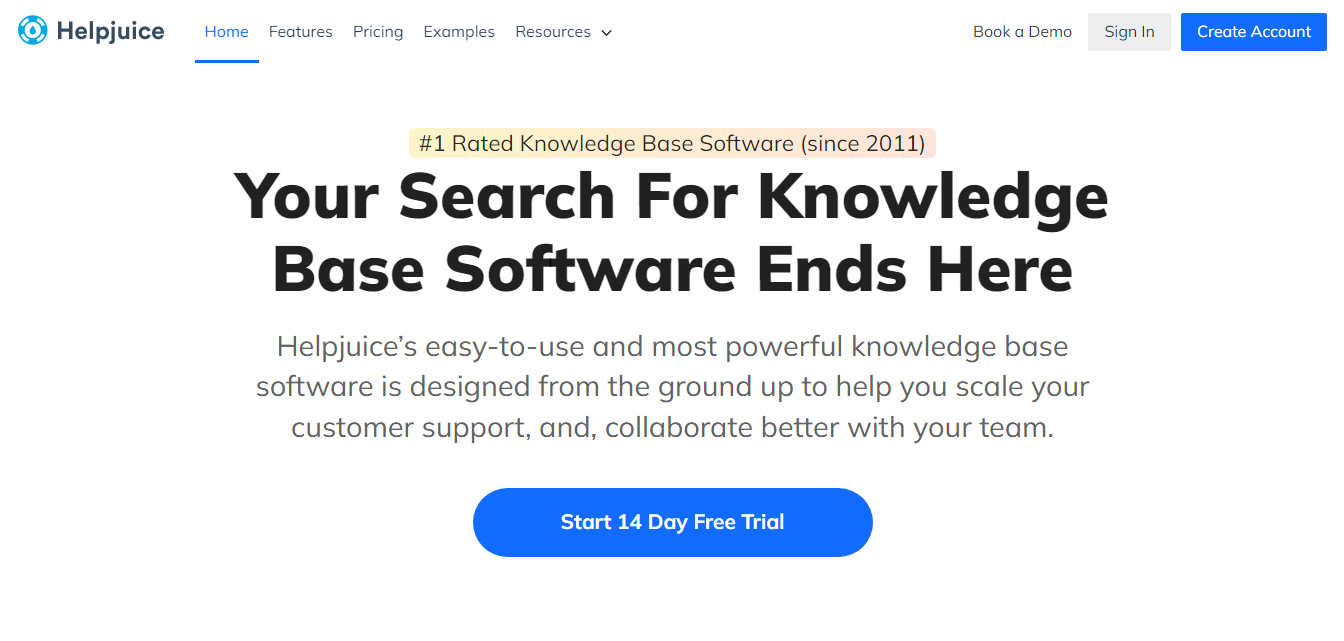
HelpJuice is a knowledge base software that’s easy to use and most powerful. It’s designed from the ground up to help you scale your customer support and provide better service.
Knowledge bases are an important part of any company, but they’re often underutilized or neglected. This leads to a lack of customer engagement, poor customer experience, and lost revenue.
Helpjuice offers knowledge base software that can help you fix these problems by providing a comprehensive solution for all your customer support needs.
HelpJuice helps you create a knowledge base online which will help your customers find solutions faster.
You can use it to provide customer support for your products and services.
This tool allows you to manage questions and answers easily. No limit to text formatting and the addition of design elements, you can add images, videos, documents, etc.
You can tag each question/answer and make it easy to find what you are looking for.
Allow multiple people to contribute to one answer through collaboration and commenting features.
You can export your data into PDF format and send it via email.
Publish multiple versions of the same article using the same editor.
Set who can see the articles, to allow for public or internal viewing of help articles.
Drag and drop files to add them to your articles.
Pricing
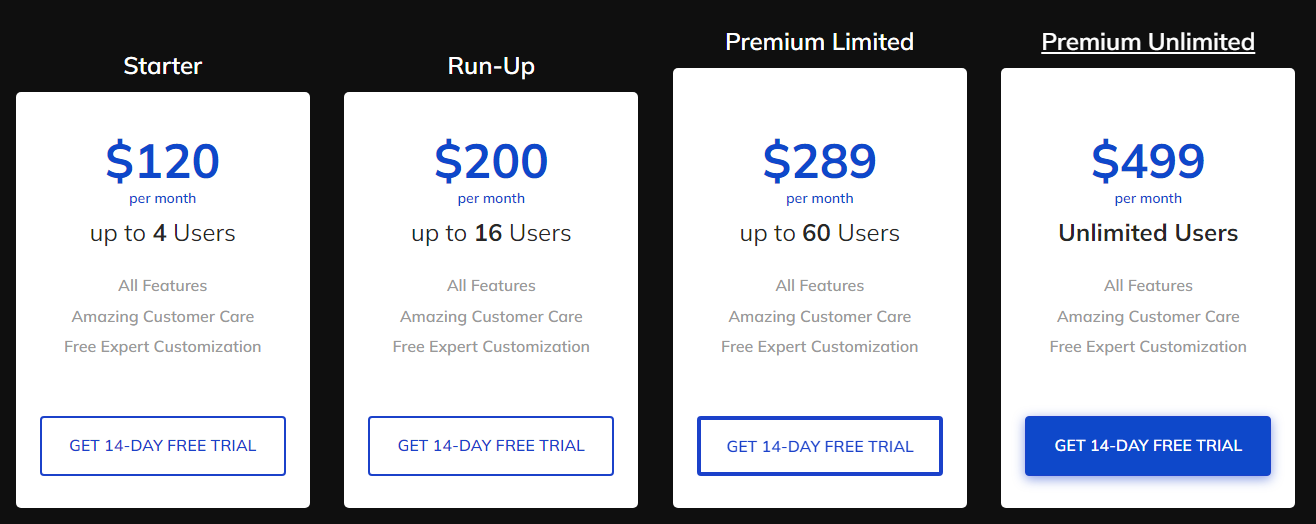
The Helpjuice pricing is easy to understand and choose from. You have a choice between 4 options ranging from $120/month to $499/month. The different plans offer you a dedicated number of users and allow you to use all features on the platform, great customer service, and free expert customization.
You can also start with a 14day free trial to try out the knowledge base software.
5. HubSpot Service Hub
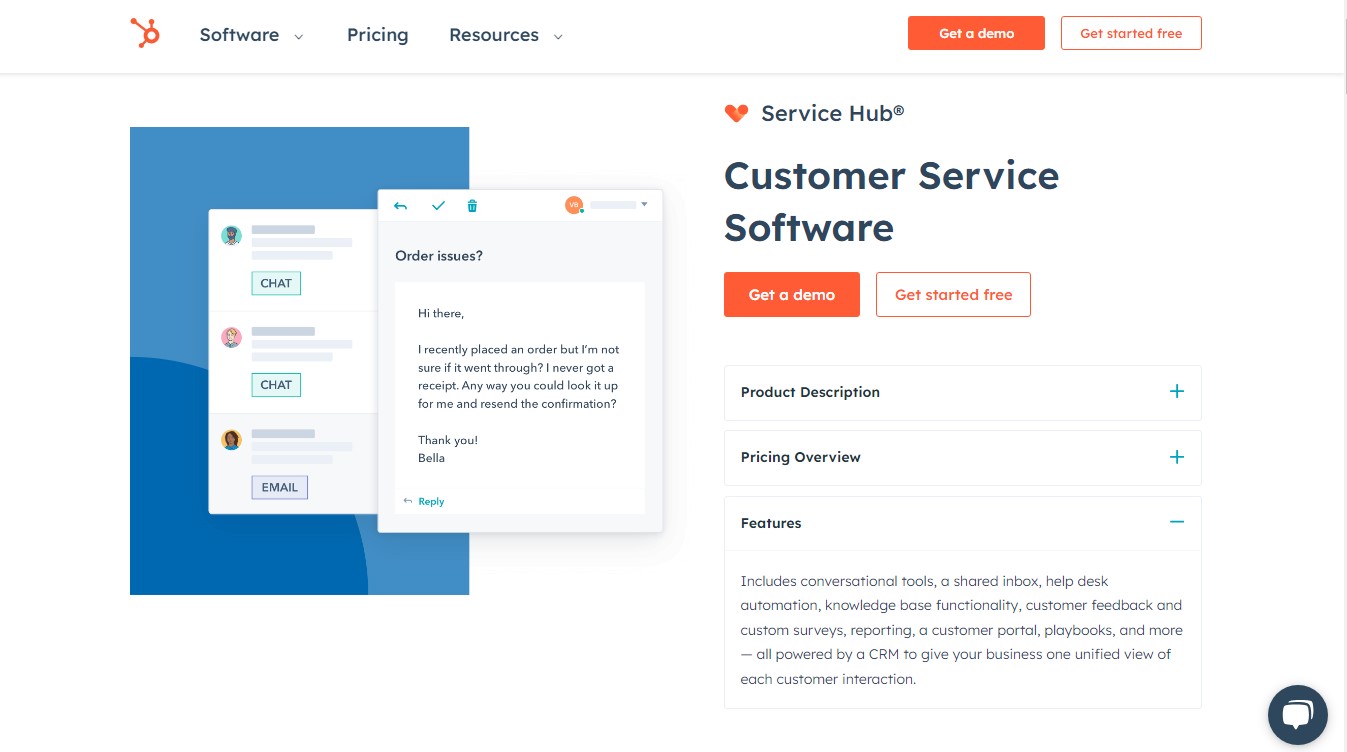
HubSpot offers a service hub that allows you to track all your customer interactions across multiple channels. You can use it to create an online knowledge base where customers can ask questions about your products and services or provide feedback.
HubSpot offers a service hub that allows you to track all your customer interactions across multiple channels, facilitating team collaboration by enabling easy access to shared information, improving communication, and streamlining the documentation process.
The company also offers integration with Salesforce, which lets you add leads from your CRM directly into their service hub. This means you can build a relationship with your customers by providing them with timely information about what’s new and relevant in your industry, even if they’re not using HubSpot.
Manage customer communications at scale through a collaborative, inbox that aggregates customer emails, chats, and more.
Use tickets to log customer issues and assign your team. All the tickets are organized, prioritized, and tracked in a central location.
Get customer feedback using surveys to gather feedback that can be used to build a better customer experience.
Automate your customer service processes with ticket routing, escalation, and task creation. Use feedback responses to kick off automated customer marketing emails or internal notifications to your team.
Frequently asked support questions and tickets into a robust, optimized knowledge base of help articles and documentation that’s indexed in search engines.
Create team-wide email aliases that automatically turn incoming emails into tickets or get routed to your conversations dashboard.
Engage in contextual, personalized customer service conversations with your customers in real-time on your website using Live Chat
Use bots to improve live chat efficiencies and scale 1-to-1 communications by routing customers to relevant help documentation, the appropriate chat agent, and more.
Use built-in reporting features to measure the impact of your customer service efforts by tracking knowledge base usage data, ticket volume and response time, customer feedback, and more.
Meet and exceed your customers’ expectations with transparency about your team’s availability. Set working hours, including automation, and report on attainment.
Empower your customers to gain ownership over their experience with a secure customer portal.
Stay productive on the go with the tools you need to collaborate and deliver support efficiently.
Pricing
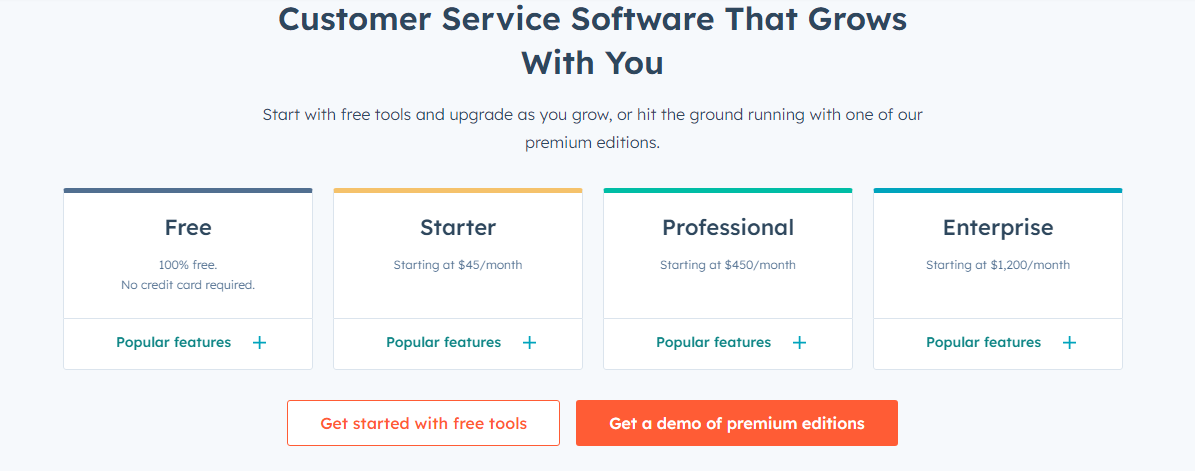
HubSpot service hub pricing starts from $45/month for the starter plan. However, the knowledge base is only available on the professional plan from $450/month with up to 5 paid users.
6. Zoho Desk
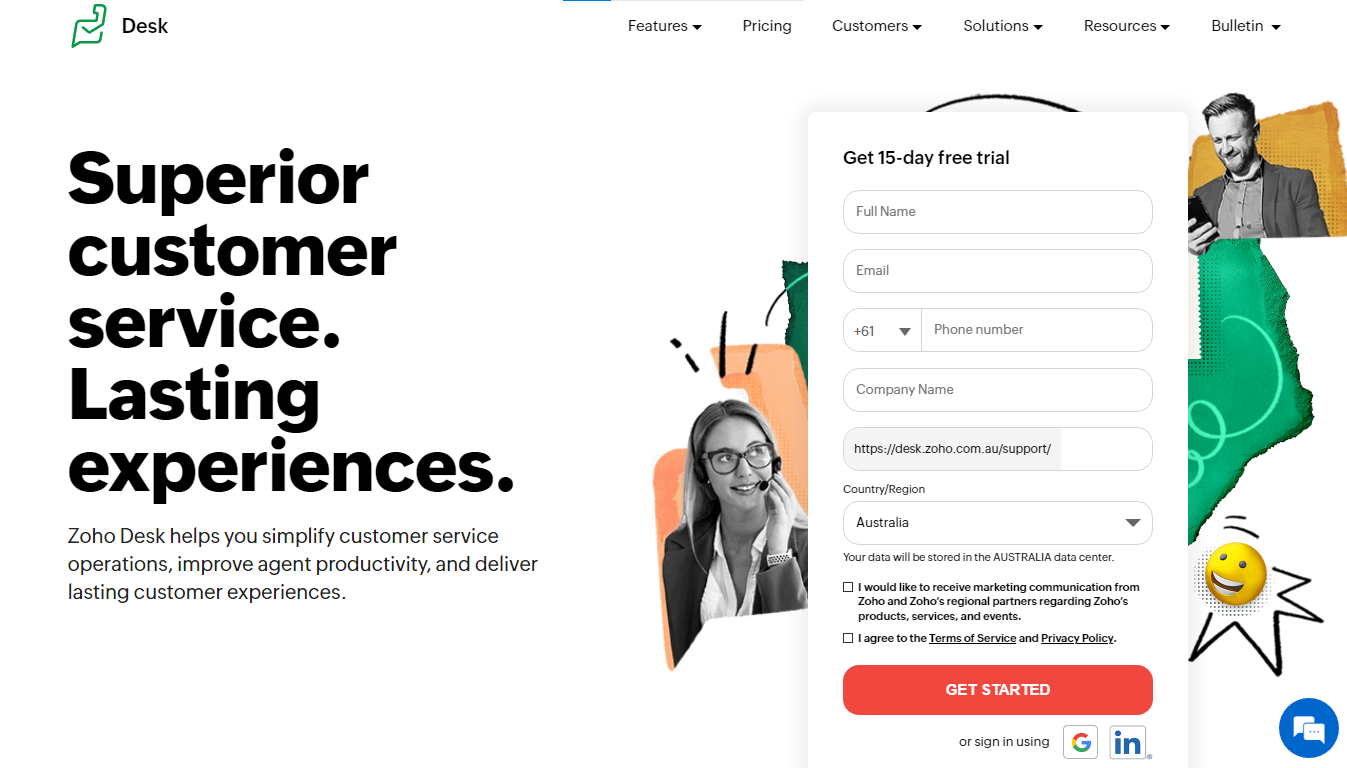
If you’re looking for a knowledge base that is easy to use, flexible, and includes a ticketing system, Zoho Desk may be the solution.
Zoho Desk has been around since 2006 and is considered one of the best knowledge base software platforms. In addition to providing a knowledge base, Zoho Desk also includes a ticketing system and helpdesk solutions.
But even on its own, Zoho Desk’s knowledge base is a solid option. The system is easy to use for writers and editors, providing separate categories for how-to articles, FAQs, and more.
Zoho Desk’s knowledge base is also flexible; users can set up portals for different customers (internal and external) and use whatever logo or branding they need.
Multi-brand help center allows you to customize your Help Center for each brand you support. You can also set up different Knowledge Base Articles for your different brands.
Customize your support portal with HTML and CSS, you can mimic the look and feel of your website on your self-service portals.
Connect your own domain to your knowledge base or help center and make it a true extension of your brand.
Create secure access to your Help Center by allowing public access or by requiring visitors to set up password-protected accounts.
Pricing
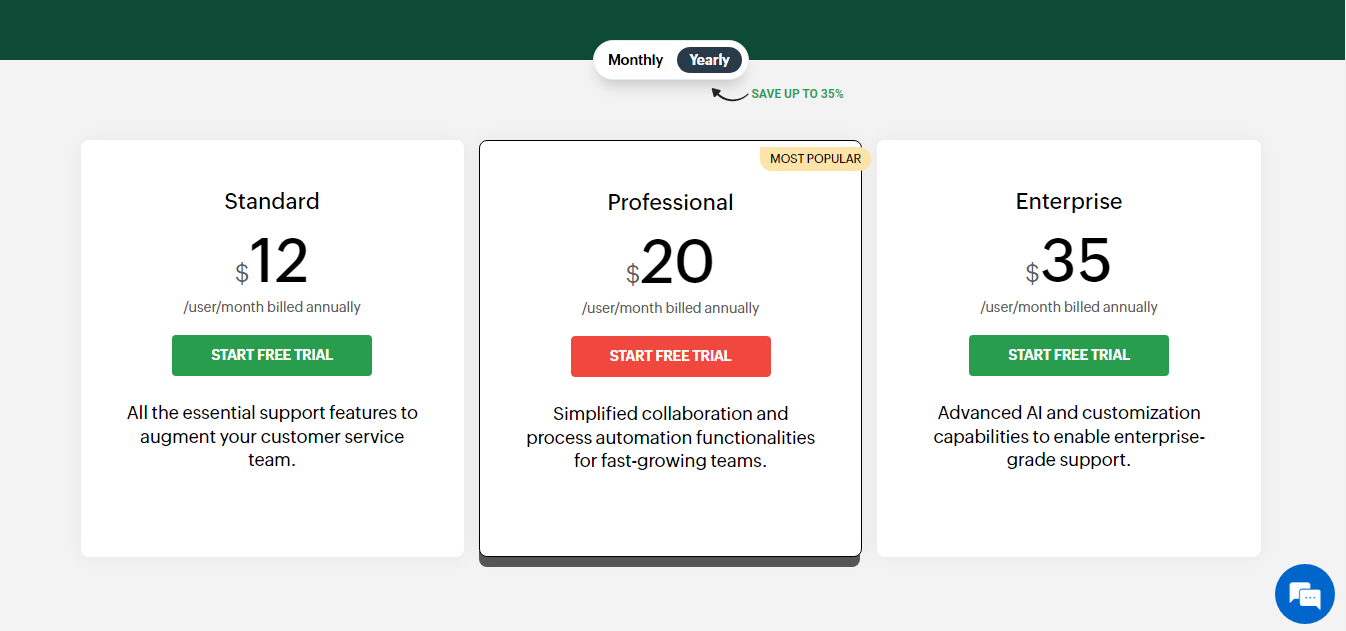
Pricing for Zoho Desk starts at $12 per user, per month. giving you all support features for your customer service team

A versatile knowledge base software integrated into their customer support platform.
7. Zendesk

Zendesk is an enterprise software application that helps companies provide better customer service. It provides features such as ticketing, knowledge base, email marketing, social media monitoring, analytics, reporting, chat, mobile apps, API integration, etc. Their knowledge base software platform allows you to offer timely service to your customers by creating an interactive help center.
This enables you to offer your customers self-service in solving problems that don’t need your intervention. With Zendesk’s higher plans you can even create multiple help centers/knowledge bases.
The product is designed to help organizations improve the customer experience while reducing costs and increasing revenue.
Zendesk Key Features
Customizable branding to offer your customers a seamless experience.
Categorization of your content to make it easy for your audience to find solutions.
Content management through an Ai-managed knowledge management system
Easy to use and setup automated workflows
Self-service portal
Content restriction to specific groups to allow you to create an internal knowledge base.
Track changes to your knowledge base content through event tracking.
The multi-language setting gives every customer the best user experience in their language.
Feedback loops help you find out if your users are finding the right answers using built-in Analytics and reporting
Customize your knowledge base to your brand using your brand logo and colors.
Easy to use content management.
The platform is optimized for SEO.
Build community forums to enhance customer engagement and user-generated content.
Customer feedback
AI and ML-enabled bots and search
Guided onboarding and knowledge base software adoption
Includes a ticketing system to enhance support
Zendesk Pricing
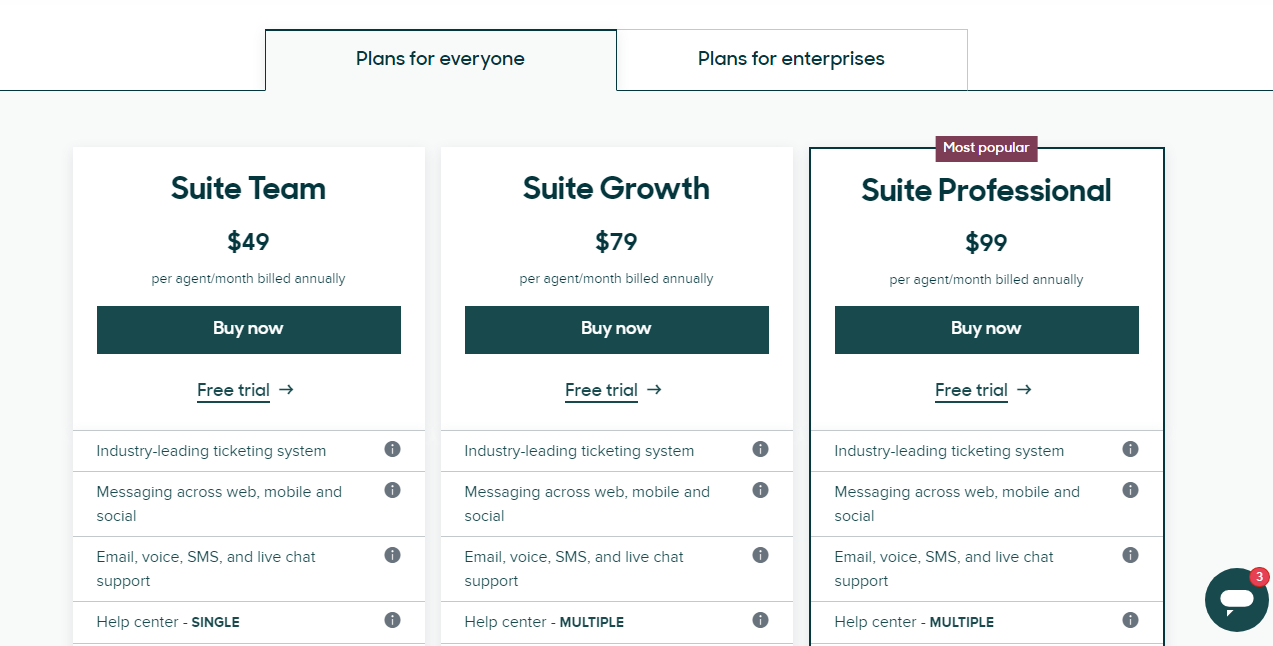
Starting as low as $49/agent per month, Zendesk’s knowledge base software is just one of the industry-leading tools you’ll be able to access in its comprehensive suite. Plus, you can try Zendesk free for 14 days to ensure it’s the perfect all-in-one solution for your business.
8. Document360
A Comprehensive Knowledge Base Software
Document360 is a robust knowledge base software designed to cater to the diverse needs of businesses seeking to enhance their knowledge management process.
As a centralized hub for storing and organizing information, Document360 empowers organizations to create a self-service knowledge base that is easily accessible to both employees and customers.
Key Features of Document360
- Multilingual Support: Document360 supports multiple languages, allowing businesses to create a knowledge base that serves a global audience. This feature is vital for organizations with an international customer base, ensuring that all users can access relevant knowledge in their preferred language.
- Version Control: With Document360’s version control, users can track changes to their knowledge base content and revert to previous versions if necessary. This feature guarantees that the knowledge base remains accurate and up-to-date, providing users with reliable information.
- Collaboration Tools: Document360 facilitates team collaboration by enabling multiple users to work on content simultaneously. Real-time commenting and editing features make it easy for teams to collaborate effectively, streamlining the documentation process.
- Advanced Search Capabilities: The software offers powerful search functionality, allowing users to find information quickly and efficiently. With intelligent search algorithms, Document360 ensures that users can access the most relevant knowledge base articles with ease.
- Customizable Branding: Businesses can customize their knowledge base with their brand colors, logos, and other branding elements. This feature helps maintain consistency with the company’s brand identity and enhances the user experience.
- Security Features: Document360 prioritizes security with features such as password protection, SSL encryption, and access controls. These measures ensure that the knowledge base is secure and protected from unauthorized access.
- Analytics and Reporting: Document360 provides detailed analytics and reporting tools to help businesses understand how users interact with their knowledge base. Insights into user behavior, popular articles, and search trends enable continuous improvement of the knowledge management system.
Pricing
Document360 offers flexible pricing plans to accommodate the varying needs of businesses. The pricing tiers typically include:
- Free Plan: Ideal for small teams and solo users, this plan includes features like a public and private knowledge base, up to 250 articles, 1,000 private readers, 5 editors, 1 workspace, a homepage builder, SEO optimization, and standard support.
- Professional Plan: Priced at $199 per project per month (billed annually), this plan encompasses all Free Plan features plus a custom domain, up to 5,000 articles, API documentation, support for 2 languages, an AI writer suite, advanced customization options, import from Word, export to PDF, onboarding assistance, and 24/5 support.
- Business Plan: At $399 per project per month (billed annually), this plan includes all Professional Plan features along with a knowledge base widget, ticket deflector, support for 3 languages, an AI search suite with 2,000 credits, advanced analytics, workflow management, public API access, onboarding with a dedicated customer success manager, all integrations, and 24/5 support.
- Enterprise Plan: Tailored for large organizations with complex needs, this plan offers all Business Plan features plus multiple single sign-on (SSO) options, unlimited articles, a sandbox environment, support for 5 languages, 2 workspaces, a complete AI suite, and additional enterprise-level features. Pricing details are available upon request.
Document360 also offers a 14-day free trial, allowing businesses to explore its features and determine the best fit for their knowledge management needs.
Why Choose Document360?
Document360 stands out as one of the best knowledge base software solutions due to its comprehensive set of features designed to enhance knowledge management.
Whether you aim to improve customer support, facilitate team collaboration, or create a self-service portal, Document360 offers the tools you need to succeed.
Its intuitive interface and robust functionality make it an ideal choice for organizations of all sizes looking to optimize their knowledge management process.
What is a Knowledge-Based Software?
Knowledge Base Software is a type of knowledge management software that allows employers to store, organize, and share information. It is designed to help businesses manage organizational knowledge internally. Knowledge bases are a way for organizations to communicate and collaborate with each other.
They help companies collect, organize and retrieve information. They are a way to share important information within an organization. Companies use knowledge bases to store information about products, processes, people, etc. Employees can use them to learn about products, procedures, policies, etc. Knowledge bases are a tool that helps employees locate information quickly.
Why is knowledge base software important for your business?
Knowledge bases are essential tools for companies looking to improve efficiency and effectiveness.
They help employees solve customer issues quickly and easily. They make it easier for customers to find information about products and services. And they provide a central location where employees can access training materials and documents.
A good knowledge base helps customers locate solutions to their problems. Customers don’t want to spend hours searching for the answer to their questions.
They want to know exactly what they need to do to fix the problem. With a good knowledge base, you can give customers the exact solution they need without having to ask them to go somewhere else.
An effective knowledge base improves employee productivity. Employees want to work efficiently and effectively. If they have easy access to the information they need, they won’t waste time hunting down the information themselves. Instead, they can focus on solving the customer’s issue.
A good knowledge management system makes it easy for employees to collaborate across departments.
Companies often use knowledge bases to store information about products and services, including product specifications, manuals, videos, FAQs, and instructions. But many organizations aren’t taking advantage of the full potential of their knowledge bases.
For example, some employees might write articles about how to perform certain tasks, while others might update product descriptions.
By making sure everyone knows about each piece of information, you ensure that no one wastes time trying to figure out how to complete a task.
A good knowledge manager can save you money. When you invest in a good knowledge management system, you can eliminate the costs associated with hiring additional IT professionals.
You can also reduce the amount of time spent updating content manually. This saves you money because it reduces the number of people required to maintain the information stored in your knowledge base.
In Summary: Knowledge Base Software
If you need an easy-to-use knowledge base software solution, then HubSpot is probably the best choice. It has a simple interface and is very user-friendly. However, HubSpot lacks advanced features such as custom fields, tags, and search capabilities.
If you need more advanced functionality, then Helpscout is a good option. It offers a lot of customization options and includes a variety of templates. You can also use it to manage customer support tickets and other tasks.
Zendesk is another powerful knowledge base software solution. It allows you to add custom fields, tags, categories, and search capabilities. It also has a mobile app that makes it easier to access your data while on the go.
Wrike is another powerful knowledge base solution for Wiki type knowledge bases that provides a lot of flexibility. It lets you customize your knowledge base by adding custom fields, tags, groups, and categories. It also has a web app that makes it easy to access your data from anywhere.
Frequently Asked Questions: Knowledge Base Software
What is the purpose of knowledge base software?
Knowledge bases are powerful tools used to provide information about products and services to customers. They provide a way for agents to easily answer questions and solve customer problems. In addition, knowledge bases help customers find solutions quicker. Agents can use knowledge bases to identify common issues, troubleshoot problems, and resolve customer concerns.
How does knowledge base software work?
Knowledge Base Software lets you create a library of information that helps your customers find what they’re searching for faster. You can use it to store product specifications, FAQs, instructions, videos, images, etc., and make sure that every customer receives the same experience no matter where they come across your site.
A knowledge base helps you keep track of how each piece of content performs. This way, you know exactly what works and what doesn’t, so you can continually improve your content strategy and optimize your site.
What types of data are provided in a knowledge base?
Knowledge bases are one of the most powerful tools you can use to improve customer experience. They help customers solve problems and find solutions faster. A knowledge base is essentially a collection of questions and answers. These questions and answers are organized into categories and subcategories.
FAQs, troubleshooting guides and onboarding flows are some examples of how knowledge bases can be used to provide helpful information to customers. Product descriptions and support documents are also great examples of what a knowledge base can do.
Internal knowledge bases can contain information like best practices, policies, procedures, and even company culture.
What is the difference between a database and a knowledge base?
Databases store raw data, whereas knowledge bases curate and arrange data into useful forms. A knowledge base is a collection of documents that contain facts about a particular topic. For example, Wikipedia is a good source of general knowledge.
In contrast, databases are designed to store large amounts of structured data such as customer records, product inventories, sales reports, etc. They are usually more difficult to use because they require specialized software tools to access and manipulate the data.
Knowledge bases are often used to provide quick answers to common questions. For instance, you might ask Siri what the weather is like today, or you could look up how to make a cake online. Databases are typically used to store massive amounts of unstructured data. You might use a database to keep track of employee salaries, inventory levels, or even flight routes.
What is a good knowledge base?
A good knowledge base need to be easy to understand. It has to be able to talk to a wide variety of people from complete beginners to technical experts. It must cover a wide range of topics including anything that users may want to learn or any issues they may face.
Finally it must be engaging to your audience to help them solve problem or learn new things quickly






